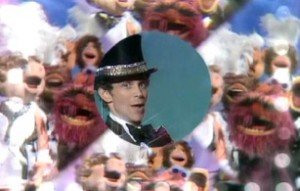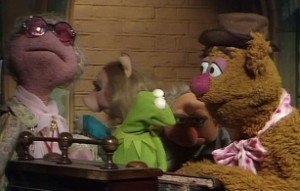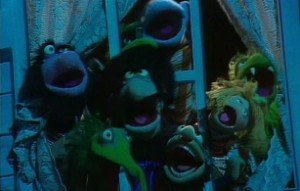The Muppet Show 1.03: “Joel Grey”
I mean, one could possibly wonder if Kermit, knowing that Gonzo’s act would have been booed as much as usual, could have actually set this whole thing up without telling Gonzo so that, when the inevitable happened, the prepared musical number would be ready, but it feels more part of the Muppet magic that this number just come together flawlessly out of the blue, as musical numbers in musicals do (again, in the musical’s own reality, not the production itself). It’s just one of the ways The Muppet Show transcends simple variety show and transitions into musical theatre, full-stop. So what was “meant” to go here, if Gonzo hadn’t required cheering up? I guess we’ll never know!
And, like the best numbers in musical theatre, one could even interpret this song here as serving a vital function–not so much in this episode but in the Muppet story as a whole. We know that early on in the show, Gonzo was a weirdo performance artist whose acts were only understood by him, but that later he became a crazy daredevil showman. What if, rather than that transition coming out of the blue, it’s due to his having taken Joel Grey’s advice, remembering “Razzle Dazzle” and all the possibilities it could represent for him? I can’t remember exactly when that transition happened, but I’ll definitely keep an eye on that as we go forward, in case my theory holds any water.
I’ve also spoken before about how the issue with both Gonzo and Fozzie in the first season was that they were both too similar and both often depressing, being sad sacks who the in-house Muppet audience didn’t like. This episode actually shines a different light on Fozzie but, unfortunately, it’s not necessarily a better one, nor is it one that’s fully compatible with the depiction of his character in the previous episode. Last week, the episode’s main plot entailed him being so unconfident in himself, his abilities, and even whether any of his friends actually liked him that he nearly left the show in defeat over a simple misunderstanding. This week, the plot is about him being so overconfident in his abilities that he drives everybody around him absolutely crazy with his new gimmick of making up jokes on the spot based on any subject that someone gives him. The problem is every time anyone says a single word, he instantly responds with a terrible joke, not unlike a child driving adults bonkers by playing the shadow game, repeating everything they say, non-stop. The more they beg him to desist, the worse it gets. At one point, even giving him the silent treatment backfires when he starts making jokes about quiet!
The writers clearly haven’t gotten a handle on Fozzie yet. In both episodes, he’s a bad comedian, but in the first, it’s because he’s too weak to stand up for himself or his abilities, and in the second, it’s because he’s showing no regard for his audience or anyone around him whatsoever. And it actually gets to the point here that he’s pretty irritating to the home viewers as well, which is one of the reasons he wasn’t a very popular character at first. Miserable and then obnoxious are not the most enticing character traits to win people over, and it took a while for the writers to find his voice.
Now, it’s not actually impossible to reconcile his behavior last week with this week. One could say that he’s really just trying too hard in this episode, overcompensating in an attempt to cover up the self-doubt that drove him last week, and that is a viable reading. It doesn’t, however, solve the likeability issue. Another strange thing is that this episode brings us yet another first–the first time we see Fozzie actually perform his comedy act–and yet it doesn’t unfold the way these scenes typically would. In a broad sense, it’s familiar. Fozzie comes out on stage and soon suffers verbal abuse at the hands of Statler and Waldorf, who here mock him by suggesting the word, “amoeba,” which he clearly doesn’t know. Finally, however, he does come up with a joke…of sorts: “Two amoeba walk out of a bar. One says, ‘Hey, is that the sun or the moon?’ and the other one says, ‘I don’t know. I don’t live around here.'” But what’s weird is that Statler and Waldorf love it (meanwhile, I barely get why it’s supposed to be funny), finally revealing they don’t know what an amoeba is either.
It’s such a strange scene, because you’d think the first instance of Statler and Waldorf interacting with Fozzie would’ve simply had them heckling him and that subversions to that premise wouldn’t have been introduced until later in the show’s run, but instead, with no explanation here, they suddenly seem to shift and like his joke out of the blue and for no apparent reason…and that’s the culmination of the “plot,” which isn’t brought up again. There’s no real punchline or payoff, and it frustratingly refuses to say anything about either Fozzie or Statler and Waldorf as characters. Is the randomness of them liking this line out of all of Fozzie’s jokes supposed to be the joke? I’m really not sure. But it underlines the fact that these early episodes weren’t held together by plots but instead by flimsy recurring gags, and even they didn’t always end up anywhere satisfying.
Other points of interest:
–I mentioned that this episode has three big Broadway numbers. The first is “Comedy Tonight” from A Funny Thing Happened on the Way to the Forum, and if you count this as the first “real” episode of The Muppet Show, it’s a fitting song to kick off the series, as it perfectly, zanily introduces the world of the Muppets to the viewer. The song and lyrics themselves, by Stephen Sondheim, are, of course, perfect and perfectly suited to the Muppets, but furthermore the presentation is spot-on, as well. The song is populated by a bunch of Frackles (from The Great Santa Claus Switch), Beautiful Day, and various Muppet Whatnots and more, all attacking each other in various ways, such as hitting and throwing knives at one another, which actually adds edge to a song versus the other two big numbers. Meanwhile, Crazy Harry makes his first appearance on The Muppet Show here (he only previously showed up in The Muppets Valentine Show, there called Crazy Donald), repeatedly blowing up everything in sight as everyone else sings around him. It’s chaotic and anarchic and mischievous and cartoonishly violent and just beautifully Muppety in every way.
–One nice thing is that, rather than initially blowing up at Fozzie, Kermit tells him that his act has possibility, in order to spare his feelings, which is a sweet early indication of their friendship, Kermit making an effort to protect him from realizing his failings as a comedian. Years later, on ABC’s short-lived The Muppets, an entire episode would revolve around this premise, albeit with a more interesting and developed plot of Fozzie discovering Kermit had lied to him and reacting negatively.
–At this stage in the show, there are a lot of senior citizen Muppets: Statler and Waldorf, Hilda, Mildred, George, and in this “At the Dance” sequence, even Zoot acts ancient, with a much creakier-sounding voice than usual. Janice (who also sounds jarring, as she’s not yet played by Richard Hunt; speaking of which, shortly after, Piggy sounds weird because she is being played by Hunt) asks him if he’d be interested in seeing The Five Temptations, and he responds, “Can you just show me a couple? I’m not as young as I used to be.” Eventually, the only remaining seniors of this group would be Statler and Waldorf, and Zoot would be played significantly younger.



